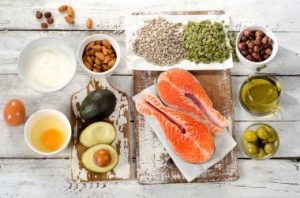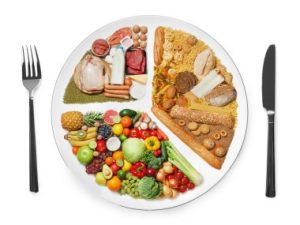
How Can A Person Achieve Optimum Daily Nutrition (5 Helpful Ideas)
How can a person achieve optimum daily nutrition? By prioritizing a well-balanced diet rich in diverse fruits, vegetables, lean proteins, and whole grains, while staying mindful of portion sizes and incorporating regular physical activity to support overall health and well-being.
In the symphony of life, where each day presents a new movement, the key to harmonious well-being lies in the art of nourishment. Crafting a masterpiece of health requires a conductor who orchestrates the symphony of daily nutrition, and you are the maestro of your own vitality.
Picture your body as a canvas, waiting to be adorned with the vibrant hues of nutrients, each brushstroke influencing your energy, resilience, and overall zest for life. Unlocking the secret to optimum daily nutrition is akin to discovering the notes that compose your body’s opus. So, let’s embark on a culinary journey, exploring the palette of nature’s bounty to create a masterpiece of wellness that resonates with the rhythm of your vibrant existence.

How Can A Person Achieve Optimum Daily Nutrition
Achieving optimum daily nutrition is a vital cornerstone for maintaining overall health and well-being. In the fast-paced rhythm of modern life, individuals often face the challenge of balancing convenience with nutritional excellence.
Optimal Daily Nutrition: A Roadmap to Health and Wellness
How can a person achieve optimum daily nutrition? It is a vital component of a healthy lifestyle, providing the body with the essential nutrients it needs to function at its best. By adopting a well-balanced and nutrient-rich diet, individuals can enhance their overall well-being, boost energy levels, and reduce the risk of various health issues.
Navigating the vast landscape of nutrition can be overwhelming, but with a strategic approach and mindfulness, anyone can create a personalized plan for achieving optimal daily nutrition.
Start with a Nutrient-Dense Breakfast
Kickstarting the day with a nutrient-dense breakfast sets the tone for optimal nutrition. Incorporate whole grains, lean proteins, and a variety of fruits and vegetables to ensure a well-rounded meal.
Embrace Variety and Colorful Plate
Variety is key to obtaining a broad spectrum of nutrients. Aim for a colorful plate, as different hues often indicate a diverse range of vitamins and minerals. This approach ensures that individuals receive a mix of essential nutrients crucial for maintaining optimal health.
Mindful Eating and Portion Control
Practicing mindful eating involves being present during meals, savoring each bite, and paying attention to hunger and fullness cues. By enjoying meals without distractions and listening to the body’s signals, individuals can avoid overeating and make more conscious nutritional decisions.
Hydration Matters
Proper hydration is often overlooked but is integral for achieving optimal daily nutrition. Water plays a crucial role in digestion, nutrient absorption, and overall bodily functions. Incorporating hydrating beverages, such as herbal teas and infused water, adds variety while contributing to overall fluid intake.
Incorporate Lean Proteins and Healthy Fats
Including lean proteins and healthy fats is essential for a well-rounded diet. Fish, poultry, nuts, and avocados are excellent options that contribute to satiety and provide essential nutrients like omega-3 fatty acids.

Understanding Nutritional Needs
Understanding nutritional needs is a nuanced process, influenced by a spectrum of individual factors. Age, a pivotal determinant, plays a crucial role in tailoring dietary requirements.
Whether one is a sprightly teenager or navigating the golden years, nutritional demands evolve, demanding attention to specific vitamins and minerals essential for growth or sustaining health.
Gender, another influential factor, accentuates these distinctions. Men and women often express distinct nutritional needs due to variations in physiological makeup. Women, for instance, may require additional iron during menstruation, while men may focus on nutrients that contribute to prostate health.
Activity level stands as a dynamic element shaping nutritional necessities. Individuals engaged in rigorous physical activities necessitate heightened intake of energy-providing nutrients like carbohydrates and proteins. In contrast, a more sedentary lifestyle might emphasize a balance that aligns with energy expenditure.
Health status becomes the linchpin in this intricate matrix. Those managing chronic conditions might necessitate specific dietary adjustments, such as reduced sodium for hypertension or increased fiber for digestive health.
Establishing Dietary Goals
In embarking on your journey to better health, it’s crucial to establish dietary goals with specificity and measurability, ensuring a roadmap for success.
Weight Management
Begin by defining clear weight management objectives tailored to your unique needs. Craft goals such as “losing 10 pounds in three months” or “maintaining a healthy BMI” will guide your nutritional choices towards a more balanced and sustainable lifestyle.
Energy Levels
Prioritize setting measurable goals to enhance energy levels, steering away from the vague notion of “feeling more energized.” opt for targets like “sustaining consistent energy throughout the day” or “reducing fatigue,” for a well-rounded approach.
Disease Prevention
Forge dietary objectives centered around disease prevention, focusing on specific health outcomes. Aim for goals such as “lowering cholesterol levels” or “improving heart health” to underscore the importance of a proactive approach to well-being.
Fitness and Performance
Elevate your fitness and performance with concrete, measurable targets. Whether it’s “increasing endurance” or “enhancing muscle strength,” align your nutritional goals with fitness aspirations. By integrating these specific and measurable objectives into your dietary plan, you pave the way for a holistic and achievable approach to health.
Building a Balanced Plate
Building a balanced plate involves incorporating the right mix of macronutrients and micronutrients to support overall health and well-being. Macronutrients, essential for energy, include carbohydrates, proteins, and fats. Carbohydrates, often dubbed as “energy-giving” foods, are found in grains, fruits, and vegetables. Proteins, the “building blocks” of the body, are abundant in sources like lean meats, legumes, and dairy. Healthy fats, vital for various bodily functions, can be derived from avocados, nuts, and olive oil.
Micronutrients, comprising vitamins and minerals, play a crucial role in maintaining bodily functions. Vitamins, known as “essential nutrients,” are present in colorful fruits, vegetables, and whole grains. Minerals, crucial for bone health and more, are found in abundance in nuts, seeds, and leafy greens.
In addition to macronutrients and micronutrients, dietary fiber plays a pivotal role in digestion. Often described as “nature’s broom,” fiber aids in digestion and helps prevent constipation. Whole grains, fruits, and vegetables are rich sources of dietary fiber. Incorporating these foods into your daily meals ensures a well-rounded, nutrient-dense plate that supports overall health. Embracing a variety of nutrient-rich foods is key to achieving a balanced plate and promoting optimal well-being.
Incorporating a Variety of Foods
Incorporating a variety of foods into your diet is like painting a vibrant canvas of nutrition, and it starts with embracing a rainbow of fruits and vegetables. The benefits of consuming a diverse array of colors extend beyond visual appeal to encompass a spectrum of essential nutrients. Phytonutrients and antioxidants, found abundantly in colorful produce, act as powerful defenders against oxidative stress, promoting overall health well-being and to achieve optimum daily nutrition.
Whole grains form another crucial element, offering not just a satisfying texture but also a wealth of fiber. These grains, such as quinoa, brown rice, and oats, contribute to digestive health and provide a sustained release of energy. Opting for nutrient-rich whole grains aligns perfectly with a wholesome approach to nutrition, meeting the body’s diverse needs in a single, delicious serving.
When it comes to lean proteins, diversity is key. Incorporating both animal and plant-based sources ensures a well-rounded intake of essential amino acids. Whether savoring lean meats, poultry, fish, or exploring plant-based options like legumes and tofu, each contributes to muscle repair, immune function, and overall vitality. The importance of amino acids in this nutritional symphony cannot be overstated, forming the building blocks of proteins necessary for the body’s various functions.
Embracing this rich tapestry of foods not only satisfies taste buds but also nourishes the body comprehensively. From the crisp crunch of vibrant vegetables to the hearty wholesomeness of whole grains and the lean elegance of diverse proteins, each bite is a step towards holistic well-being. So, savor the rainbow, relish the whole grains, and diversify your proteins – because a nutrient-packed plate is a masterpiece for your health.

Mindful Eating Practices
Mindful Eating Practices: Nourishing Your Body and Soul
In the bustling rhythm of modern life, adopting mindful eating practices has become a beacon of balance and well-being. At the forefront is the art of slow and mindful eating, where each bite is savored and celebrated. Chewing thoroughly becomes a meditative act, fostering a connection with the textures and flavors that often go unnoticed. Recognizing hunger and fullness cues becomes second nature, tuning in to the body’s signals and responding with intuitive nourishment.
In the realm of portion control, the mantra is not deprivation but rather conscious moderation. By using smaller plates, the visual illusion of abundance is created, promoting a sense of satisfaction with less. Being aware of serving sizes takes center stage, empowering individuals to make informed choices about their nourishment. These practices are more than a culinary ritual; they’re a mindful journey.
Hydration
Water is indispensable for overall well-being, with a paramount role in facilitating digestion and enhancing nutrient absorption. Akin to a vital elixir, it lubricates the digestive system, ensuring smooth transit of food through the gastrointestinal tract. Adequate water intake is pivotal for optimal nutrient assimilation, a fact often underscored by health experts and nutrition enthusiasts. Meeting the recommended daily water intake, typically around 8 glasses or 2 liters, is commonly touted as a cornerstone of a healthy lifestyle. This daily hydration prescription is echoed in wellness circles, emphasizing the need for people to stay adequately hydrated.
Meal Planning
Meal planning is a strategic approach to ensure a seamless and efficient culinary experience, encompassing weekly meal preparation, batch cooking, and the meticulous planning of balanced meals. Embracing the concept of batch cooking allows individuals to prepare large quantities of food at once, optimizing time and effort. This technique not only promotes convenience but also establishes a foundation for a well-organized weekly menu. Planning for balanced meals is paramount, emphasizing a thoughtful combination of proteins, carbohydrates, and vegetables to meet nutritional needs.
Executing a successful weekly meal plan involves foresight and consideration. Begin by designating a specific time each week for meal preparation, creating a routine that simplifies the process. Harness the power of batch cooking by preparing versatile staples such as grains, proteins, and sauces in larger quantities, ensuring flexibility in assembling diverse meals throughout the week. In the realm of balanced meals, prioritize a variety of nutrient-dense ingredients, aiming for a harmonious blend of flavors and textures.
Achieving culinary harmony through meal planning is not only a practical approach but also a mindful investment in overall well-being. Elevate your meal planning experience by incorporating fresh, seasonal produce, and explore creative combinations to keep your palate engaged. Whether you’re a seasoned meal planner or a novice embarking on this culinary journey, embracing these practices fosters a sense of empowerment and control over your nutritional intake. Mastering the art of weekly meal preparation, batch cooking, and crafting balanced meals lays the foundation for a healthier, more efficient, and enjoyable relationship with food.
Limiting Processed Foods and Added Sugars
Limiting processed foods and added sugars is crucial for maintaining a healthy lifestyle. Understanding hidden sugars is paramount, as these sneaky sweeteners can be disguised under various names like sucrose, high fructose corn syrup, or even as healthier-sounding alternatives like agave nectar. Reading food labels diligently empowers individuals to identify and avoid these hidden culprits. Opting for whole, minimally processed foods is a cornerstone of a nutritious diet. By prioritizing these practices, you pave the way for a healthier lifestyle and make informed decisions that positively impact your well-being.
Managing Special Dietary Needs
Managing special dietary needs involves navigating a complex landscape of dietary restrictions, cultural nuances, and personal preferences with finesse and understanding. A crucial aspect is addressing allergies and intolerances, ensuring a safe and inclusive dining experience. This involves meticulous attention to allergen awareness, ingredient transparency, and cross-contamination prevention.
Cultural and ethical considerations further enhance the challenge. Respecting ethical choices, such as vegetarianism or veganism, requires creative descriptions like “plant-based delights” and “ethically sourced ingredients.” Highlighting these aspects not only respects individual choices but also broadens the appeal of your culinary offerings. Addressing personal preferences and taste is the ultimate art of culinary management. This not only accommodates individual tastes but also emphasizes a commitment to customer satisfaction.
Seeking Professional Guidance
When navigating the complex realm of nutrition and wellness, individuals often find solace and clarity by seeking professional guidance. Consulting with a registered dietitian or nutritionist proves invaluable, offering personalized insights tailored to one’s unique needs and goals. These experts provide individualized advice, crafting dietary plans that resonate with a person’s lifestyle, preferences, and health objectives.
Amid the sea of information on nutrition, the role of a dietitian stands out, ensuring that the guidance received is not only evidence-based but also aligned with the latest scientific findings. For those grappling with specific health concerns, be it weight management, dietary restrictions, or chronic conditions, a dietitian becomes a beacon of knowledge, addressing these issues with precision and empathy.
As individuals increasingly prioritize their well-being, the demand for professional nutritional guidance has surged. Recognizing the significance of expert advice in fostering healthier lifestyles, more people are actively searching for registered dietitians and nutritionists online, to connect with professionals who can navigate the nuanced landscape of nutrition with expertise and understanding.

Incorporating Physical Activity
Achieving optimal health involves the dynamic synergy between nutrition and exercise, forming the cornerstone of a balanced lifestyle. The intertwining relationship between proper nourishment and physical activity is paramount, fostering overall well-being and vitality.
As individuals embark on their fitness journey, a wholesome diet acts as the fuel, providing essential nutrients to support muscle function, boost metabolism, and enhance endurance. This powerful fusion of nutrition and exercise not only accelerates weight management but also cultivates resilience, resonating in the pursuit of a healthier lifestyle.
Meeting the energy demands for physical activity is a fundamental aspect of maximizing workout efficiency. Whether engaging in cardio, strength training, or any fitness regimen, understanding and catering to the body’s energy needs is key. “Balanced nutrition for energy” becomes a focal point.
By aligning dietary choices with the demands of physical exertion, individuals unlock their true potential, powering through workouts with vigor and achieving peak performance. The art of nourishing the body for exercise is integral to surpassing fitness milestones.
Monitoring and Adjusting
Monitoring and adjusting dietary habits is crucial for achieving and maintaining optimal health. Regular assessments of dietary habits, including food intake and nutritional choices, provide valuable insights into one’s overall well-being. By employing these assessments, people can identify patterns, such as “eating habits” and “food preferences,” allowing for informed adjustments.
Adjusting based on changing needs and goals is a dynamic aspect of effective nutrition management. Whether aiming for weight loss, muscle gain, or overall wellness, adjusting dietary practices becomes paramount. Regularly reviewing and tweaking “meal plans” and “nutrient intake” in response to changing goals ensures that individuals stay aligned with their health objectives.
Incorporating these monitoring and adjusting practices into one’s routine enhances the chances of success in achieving a balanced and sustainable lifestyle. Consistent monitoring, coupled with adaptable adjustments, empowers individuals to navigate their nutritional journey with precision and intention.
Educating and Sharing Knowledge
In fostering nutritional literacy, the mission revolves around enlightening individuals about the significance of making informed dietary choices. It is believed that imparting knowledge about nutrition is pivotal for cultivating a healthier community. This approach extends beyond disseminating facts; the aim is to demystify nutritional jargon, empowering people with practical insights into balanced eating.
By creating a repository of accessible information, strive to dismantle the barriers associated with nutritional education. The commitment is to promoting nutritional literacy is underscored by dedication to bridging the gap between scientific principles and everyday dietary decisions.
Furthermore, advocacy extends to instilling enduring healthy eating habits within the community. I recognize the vital role that habits play in shaping one’s lifestyle, and you are resolute in your endeavor to foster positive changes. From organizing interactive workshops to crafting engaging educational content, these initiatives are designed to resonate with individuals of diverse backgrounds to prioritize user-friendly resources that simplify complex nutritional concepts, utilizing language that resonates with the vernacular commonly employed when discussing health and wellness.
Through this community-driven approach, aspire to catalyze a collective shift towards a culture of mindful and nourishing food choices. Join this journey of empowerment, where knowledge becomes the catalyst for transformative and sustainable well-being.
Staying Informed
Staying informed about nutritional research and guidelines is crucial for maintaining a healthy lifestyle. With a constantly evolving landscape of information, it’s essential to adapt to the latest knowledge and recommendations. Stay updated on nutrition trends, explore dietary studies, and embrace new findings to make informed choices about your well-being.
Keep pace with emerging guidelines, nutritional insights, and health trends to ensure you’re following the most effective and science-backed practices. By staying informed, you empower yourself to make mindful decisions that positively impact your overall health and wellness journey. Stay connected to the latest in nutritional science, and stay ahead in the pursuit of a healthier, happier life.
Frequently Asked Questions (FAQ) about How Can A Person Achieve Optimum Daily Nutrition
Q. What is optimum daily nutrition, and why is it important?
Optimum daily nutrition refers to consuming the right balance of nutrients to support overall health and well-being. It is essential for proper bodily functions, energy levels, and disease prevention.
Q. How can I determine my individual nutritional needs?
Individual nutritional needs vary based on factors like age, gender, weight, activity level, and health conditions. Consulting with a registered dietitian or healthcare professional can help assess your specific requirements.
Q. What does a balanced diet look like for optimum daily nutrition?
A balanced diet includes a variety of fruits, vegetables, whole grains, lean proteins, and healthy fats. Aim to incorporate a diverse range of foods to ensure you get a broad spectrum of nutrients.
Q. How can I ensure I get enough vitamins and minerals daily?
Eating a colorful array of fruits and vegetables is a great way to obtain a variety of vitamins and minerals. Whole, unprocessed foods are generally rich in essential nutrients.
Q. Is it necessary to take dietary supplements for optimum nutrition?
In most cases, getting nutrients from whole foods is ideal. However, some individuals may require supplements based on their specific needs. Consult with a healthcare professional before starting any supplement regimen.
Q. How can I maintain a healthy weight while ensuring optimum nutrition?
Focus on portion control, mindful eating, and a well-rounded diet. Incorporate regular physical activity into your routine to support overall health and weight management.
Q. Is it okay to indulge in treats or “cheat meals” occasionally?
Occasional treats are acceptable in a balanced diet. The key is moderation. Enjoying indulgent foods in moderation won’t significantly impact your overall nutrition.
Q. What role does hydration play in optimum daily nutrition?
Hydration is crucial for overall health. Drink an adequate amount of water throughout the day to support bodily functions, aid digestion, and maintain energy levels.
Q. How does meal timing affect optimum nutrition?
Eating regular, well-timed meals helps maintain steady energy levels and supports metabolism. Aim for balanced meals and snacks throughout the day to avoid extreme hunger.
Q. Can I achieve optimum nutrition on a specific diet, like vegetarian or vegan?
Yes, a well-planned vegetarian or vegan diet can provide all the necessary nutrients. Ensure diversity in food choices, and consider consulting with a nutritionist to address specific concerns.
Conclusion
In conclusion, achieving optimum daily nutrition is a multifaceted endeavor that requires a combination of mindful dietary choices, balanced meal planning, and a commitment to a healthy lifestyle. By embracing a diverse and nutrient-rich diet that includes a variety of fruits, vegetables, whole grains, lean proteins, and healthy fats, individuals can ensure they are meeting their body’s nutritional needs. Additionally, staying hydrated, moderating portion sizes, and incorporating regular physical activity contribute significantly to overall well-being. It is essential to cultivate a sustainable and personalized approach to nutrition, considering individual preferences, cultural factors, and any specific dietary requirements. Ultimately, by fostering a conscious and informed relationship with food, individuals can pave the way toward achieving and maintaining optimum daily nutrition for a healthier and more vibrant life.